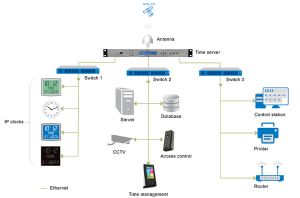TIME SERVERS
Synchronizing Networks for Precise Timekeeping.

In the modern digital era, accurate and synchronized timekeeping is critical for numerous industries and applications. Time servers play a vital role in ensuring that networks, devices, and systems are precisely synchronized, enabling seamless operations, secure transactions, and effective collaboration across distributed environments.
At the heart of time synchronization is the time server, a dedicated device that receives highly accurate time signals from reliable sources, such as atomic clocks or global navigation satellite systems (GNSS). These signals serve as a reference point for the time server, which then distributes the accurate time information to connected devices and systems within a network.
The primary function of a time server is to maintain consistent and accurate time across a network or system. By providing a single source of time, the time server eliminates discrepancies that may arise due to variations in local clocks or network delays. This synchronization ensures that all devices and systems within the network operate in unison, enabling seamless collaboration and accurate time-stamping of events.
Time servers employ various time synchronization protocols to distribute accurate time information. The Network Time Protocol (NTP) and Precision Time Protocol (PTP) are commonly used protocols that enable precise time synchronization across networks, regardless of their size or geographical distribution. These protocols ensure that time updates are transmitted efficiently and accurately, minimizing time drift and maintaining synchronization within acceptable tolerances.
Time servers offer scalability to accommodate networks of any size, from small local networks to large enterprise environments. They can synchronize thousands of devices, including computers, servers, network infrastructure, and IoT devices, ensuring uniform timekeeping throughout the network. This scalability is essential for industries that rely on accurate time synchronization, such as financial services, telecommunications, power grids, and industrial automation.

Reliability and redundancy are crucial aspects of time server design. High-quality time servers are built with redundant power supplies and multiple network interfaces to ensure uninterrupted operation and seamless failover in the event of a hardware or network failure. Redundancy eliminates single points of failure and enhances the overall reliability and availability of time synchronization.
Time servers also provide security features to protect against unauthorized access or tampering. Encryption protocols and authentication mechanisms safeguard the integrity of time information, ensuring that only authorized devices and systems can synchronize with the time server. This security is particularly important in industries that require secure transactions, regulatory compliance, or data integrity assurance.
Partnering with reputable time server providers ensures access to reliable, accurate, and feature-rich solutions. Experienced providers offer guidance on selecting the appropriate time server model, assist with installation and configuration, and provide ongoing support and maintenance to ensure optimal performance and synchronization accuracy.
Time servers play a fundamental role in maintaining accurate time across networks and systems. By synchronizing devices to a common time reference, time servers enhance operational efficiency, facilitate secure transactions, and enable effective collaboration in today’s interconnected world. Invest in a robust time server solution to ensure precise timekeeping and synchronization for your network or system.
